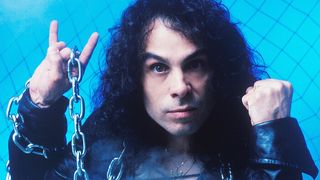He’s the standard for metal singers
“Everywhere I go, people still talk in the most respectful terms of Ronnie and how much he means, so he absolutely remains the man everyone wants to emulate – or try to emulate. That’s not just with his vocal style, but also with the way he behaved as a frontman. I was talking to David Draiman of Disturbed recently, and he said that he got the way he talks to an audience from the way Ronnie used to do it. So, on any level you mention, Ronnie is the person we all look up to as being the ultimate singer and stage performer. No one has replaced him.”
He was the raddest dude
“He was just such a fantastic human being. I have yet to come across anyone who knew and worked with him who has a bad word to say about Ronnie. And when we toured with Heaven & Hell, I learnt so much from the man. One important thing was to make sure you spend as much time as you can with the fans, talking to them, and signing photos or posters. He told me that while this might just be another gig on a long list for you, to the fans at the show it means everything. I have never forgotten that.”
He inspired generations
“The first time I heard Ronnie was when my dad played the Holy Diver album. I was struck not just by the power in Ronnie’s voice, but also how he made it all sound so beautifully effortless. I instantly became a massive fan. I was about 12 years old at the time, but went out to discover what he had done before, first with Rainbow, then with Black Sabbath. But it was with Holy Diver that my love affair with Ronnie began. He had a presence in his voice unlike anyone else.”
He was a team player
“Every musician you talk to who ever worked with Ronnie tells you that he never just concentrated on his voice. He was a fine songwriter who thought about what was best for the music in the widest sense. He brought out the best in those musicians he worked with – and there have been some truly amazing ones. He had a way of articulating what he felt a song needed to everyone in the band, and apparently encouraged them to be the best they could be. I guess in that sense Ronnie was the conductor, the man who made it all come together.”
He had a great sense of humour
“I wish I had gotten to tour a lot more with Ronnie than I did, because then I would have been privileged to know the person behind the persona a lot more. As it was, I always found him to be delightful company. Not only was he full of great advice, but he definitely loved a joke, and would always have the right funny line for any occasion. People who knew him a lot better than I did have since told me he loved joking around and making everybody laugh. From what I saw, yes, he had a mischievous glint in his eye!”
He simply killed it live
“If I had to recommend any of Ronnie’s albums, I would definitely choose the live album from Donington in 1983 [At Donington UK: Live 1983 & 1987]. The performance from ’83 is absolutely amazing. Not only does Ronnie sound incredible throughout, but he does everything you would wanna hear. There are the songs from the Holy Diver album, for a start, but on top of this you also get some fantastic Rainbow and Black Sabbath tracks. And the recording from ’87 is cool as well! When you listen to Ronnie in the sort of form he’s in on a live album like this, it brings home what a truly special artist he was.”


